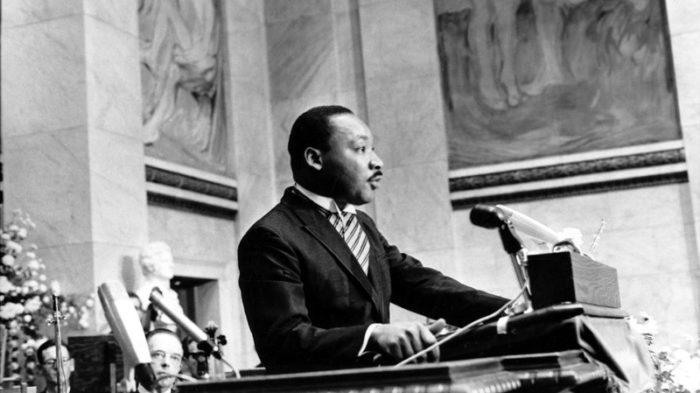 “I accept this award today with an abiding faith in America and an audacious faith in the future of mankind.”
“I accept this award today with an abiding faith in America and an audacious faith in the future of mankind.”
-Martin Luther King, Jr., December 10, 1964
In Dec. 1964, the Reverend Martin Luther King, Jr., joined workers on strike in Atlanta, Ga., and tied the fight for economic justice to the civil rights movement, with a pithy sound bite. The U.P.I. reported King said, “What good does it do a man to have integrated lunch counters if he can’t buy a hamburger?”
King’s hamburger line wasn’t a throwaway comment for media. While he was known for his civil rights work, his support for the labor movement ran deep. For instance, in Illinois in Oct. 1965, King addressed the Illinois AFL-CIO Convention where he explored the intersection between the civil rights and labor movements.
“The labor movement was the principal force that transformed misery and despair into hope and progress. Out of its bold struggles, economic and social reform gave birth to unemployment insurance, old age pensions, government relief for the destitute, and above all new wage levels that meant not mere survival, but a tolerable life.”
King used the hamburger quote tying civil rights to labor at least two other times.
King’s comments in Atlanta perhaps garnered more attention than usual because ten days earlier, King had accepted the Nobel Peace Prize. His somber speech in Oslo, Norway came on the heels of brutal attacks on peaceful protesters in Birmingham, on churches, and on people registering to vote.
“I accept this award on behalf of a civil rights movement which is moving with determination and a majestic scorn for risk and danger to establish a reign of freedom and a rule of justice. I am mindful that only yesterday in Birmingham, Alabama, our children, crying out for brotherhood, were answered with fire hoses, snarling dogs and even death. I am mindful that only yesterday in Philadelphia, Mississippi, young people seeking to secure the right to vote were brutalized and murdered. And only yesterday more than 40 houses of worship in the State of Mississippi alone were bombed or burned because they offered a sanctuary to those who would not accept segregation. I am mindful that debilitating and grinding poverty afflicts my people and chains them to the lowest rung of the economic ladder.”
The Nobel Prize acceptance speech is a lesser known King speech that is definitely worth watching or reading right now if you have the time.
This is the fourth in our series of posts about Martin Luther King, Jr., to mark the 50th anniversary of his assassination in Memphis, Tennessee, on April 4, 1968. Read the third installment, about the most famous speech last century, here.
Next, read the fifth installment, about Honorary Longshoreman Martin Luther King, here.